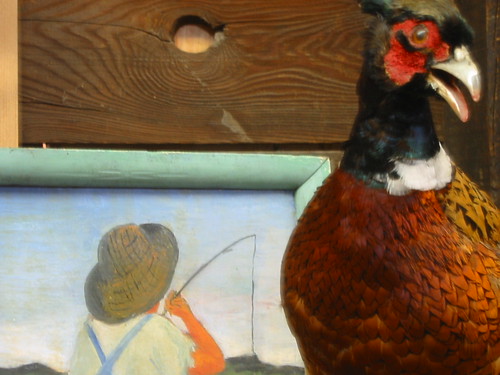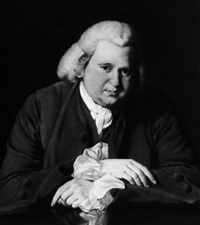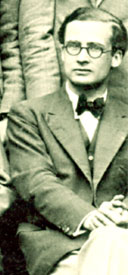
Pistol
Trying my darnedest to pull together an “annotated” list for Steve Evans’s Attention Span, that “collectively-drawn map of the field,” one of the most satisfying collaborative labors of the “age.” Trouble is, I look back at a year “in ruins,” full up with fictions. And, my books a-jumble, double-shelved everywhere, I am sure to’ve overlooked something. My big reading jags included everything I could find by Gilbert Adair, a monster-passel of Jonathan Lethem, a growl or two of Edward Dahlberg, some Susan Sontag, culminated (fiercely soared—meaning if I had to pick one single book of the year) with the first volume, recently translated by Joachim Neugroschel, of Peter Weiss’s extraordinary trilogy, The Aesthetics of Resistance, and moved lately into the newish Spanish-language writers Roberto Bolaño, Javier Marías, and César Aira. If I review my meagre notes, I see too little poetry—as if the bust-out torrential accumulation of it all’d made me draw back. That, or my aversion to the increasingly predictable and puerile “disjunctive” practices, as if a heap of fragments’d be enough. Nevertheless, I’ll squint and spit and consider. (Some of the notes are new, some pulled out (“reframed”) of notes at Rue Hazard, or Isola di Rifiuti. No particular order.) Alors:
Merrill Gilfillan | Selected Poems 1965-2000 | Adventures in Poetry | 2005
For the precisions (and imprecisions) of the natural world and all the human debris that impinges on it. “A hem of willows worn basketball orange.” Lots of Gilfillan’s early work, the originals published by Doones, Angel Hair, Blue Wind, legendary and now hard to find. Poetry less spare and incisive (cut) than Gilfillan’s current stuff, though the eye is nearly as infallible. See:
Piss Ant and PeonyBonus: back cover photograph of Gilfillan in Iowa City circa 1968, manual typewriter, pheasant feather stuck in Lancer’s bottle, dirty ashtray, paper clutter, tumbler in fist.
The word peony
like the word firefly
held so powerful a charge
for the Japanese
it was used in poems
sparingly, with great care
and Harry
was Thomas Eakins’
dog. . . .
Ryan Murphy | Down with the Ship | Otis / Seismicity | 2006
Disparate elements hard-bargained for, and won. “Alka-Seltzer, auburn, / creosote, combine. / I resolve.” Murphy’s first book, though he’s put out a couple chapbooks. He’s another (authentic) sucker for the ongoing miasma and effervesce of the natural world, a thing increasingly rare. “We mourn the loss / of our nature poets.” Dopey syntactical sleights, Poems for Pitchers (“Dear Gaylord Perry”), a willingness (rare, too) to write feelings plain, or barely daubed with admissible sardonic tinge, enough to complicate the delivery of things:
You’re undressing in the dark
You’re undressing in the shotgun light
of a Coors can
What tides await us
Sincerely, Hokusai
Elizabeth Willis | Meteoric Flowers | Wesleyan UP | 2006
Though I didn’t exactly savage Meteoric Flowers, I did turn a wry eye at its achievement (only if aligned against its ambition), drawing my measure for the latter off Willis’s nod to the polymathic over-achiever Erasmus Darwin, late eighteenth-century doctor, botanist, inventor, poet, and intellectual precursor to grandson Charles. Willis, in a “Note on the Text,” says Darwin’s Botanic Garden (1791) “suggested not so much a form as a sensibility with which to approach a period of political, intellectual, and biological transformation.” Of the pieces in the book, Willis admits how “In their unwieldy asymmetries and their sudden leaps between botany, political and aesthetic history, technology, and pastoral romance, this work of the late Enlightenment seemed an eerily apt model for riding out the inter-discursive noise of the early twenty-first century. Poetry, it says, can be at once an account of the physical world, a rethinking of the order of things, and a caprice.” I deplore the lack of the “nitty-gritty” in Willis’s book, the lack (mostly) of everyday horrors, daily loss and seemingly systemic moral hijinx that passes for government—nevertheless, the book does provide satisfying lyrical displays in prose that sings the synapses alert. “If I appear to play the violin, it’s only to keep my head on. Everything heavy falls in September, a fire truck lost on polar seas.” “I’m drawn to the warmth of what doesn’t belong to me, waking up on the bus with money in my pants.”
Ange Mlinko | Starred Wire | Coffee House | 2005
I first encountered Ange Mlinko’s poems around the period of Matinées, I don’t recall where exactly. Immediately struck by the speed, dash, verve, a kind of headlong full-tilt reminiscent of some of O’Hara’s (think of stuff circa “For the Chinese New Year & For Bill Berkson”). That “mode” is still evident in Starred Wire, mighty and insouciant, as in the first poem, “Là”:
In a dream grief feels like grief, joy feels like joy,Tracery of a mind’s shuttlecock, weaving it in. Other poems in Starred Wire indicate a restlessness, studying beyond to see what else Mlinko is capable of. Plenty. High sassy diction flings: “‘Amuse bouche,’ she said. ‘Now that we’re alone in the camp here, / foot caught in the bag handle, impish.’ / Whenas she became a Supreme Court Justice, / and ‘Ev Geny Believe Dostoevsky, Fyodor,’ reverse-engineered / an acronym limpidly decoded on piano. Also, / the coffee stopped working.” Deadpan humor bouts: “—is it ‘plumage’ if it doesn’t ostentate?” and “now ‘Shellac the lilac’, I instruct.” Uncanny precision: “A cape of rain hit the horned land.” Ludic philanthropic (free, rather than gratuitous) stylings: “It exercises cerise . . .” Exclamatory hyperventilisms: “Screw you, charm!” Good sense scorn: “The argument that year that year was that ‘hyacinth’ / should not be used where ‘flower’ suffices.” Direct statement (as momentary resting place for excitement): “I was trying to describe the perfect library when I remembered that all you need to know is its etymology, rallying place.” And (writ for the twenty-first century) feelings: “You be eros, I’ll be pensée.
adrenaline in any case is adrenaline surging through the veins.
Why do dreams affect us so strongly, turning innocents
into incubi or worse making us fall in love and ruin our lives?
In dreams there is communication between interior and exterior,
as they say of labyrinths. That means there’s at least one exit.
But all the gates and port may be put on alert.
You may get a malady. . . .
Kent Johnson | Epigramititis: 118 Living American Poets | BlazeVox | 2006
It is entirely possible that Kent Johnson’s Epigramititis’ll come to seem the “Hugh Selwyn Mauberley” of our age. Guy Davenport: “It is man’s ineptitude that he has not remembered his own past.” And: “What is most modern in our time frequently turns out to be the most archaic.” What Johnson’s done, with an amiably sharp wit, and deftly, is to revive (for, particularly the dull originality-scrounging “post-avants”) a manner and a form—naming names, taunting (boastfully), pricking the pomposity of the smug, the retrograde, and the earnest. He does it with a roughshod ease, a “friendly” note—if nipping satire can be termed so. “Combative collegiality” is what Johnson himself terms it—in the Greek tradition—a thing “long gone.” As Johnson puts it (rightly): “Poetry is a kind of business now,” (and such pricking is disallowed). Here’s one epigram, placed next to a petulantly toupéed and pouty-looking Donald Trump (the accompanying pictures are impeccably selected, and paired):
David LehmanAnd, permit me, one more (put next a defiantly bored-looking Telly Savalas, negligently idling a lollipop in mouth, bald):
In the Preface to the 1999 edition
of The Best American Poetry,
he called me “incontrovertibly brilliant”
and invited me to read at the KGB.
But then (O bitchy fickleness, thou marrow
of all poesy, of the last avant-garde,
even!), he decided he didn’t like me.
David AntinThe book’s a veritable incendiary device (better stomp on it).
Shortly after 9/11, he spoke in writing
on the listserv Poetics: “If you encounter
a terrorist on a plane, you don’t politely
request that he return to his seat, you
pull out a .45 and you shoot him.”
History is unstoppable in its teleological
drive to unity: Pop culture merges
with the humanities; the Talk Show merges
with Talk Poetry. And huge decompressed
machines fall, like ideologemes, out of the air.
Jeni Olin | Blue Collar Holiday & A Valentine to Frank O’Hara | Hanging Loose | 2005
I find Jeni Olin’s work “simply smashing”—and the way that rather Carnaby Street lingo comes up is, I think, directly to the point. She is reckless, omnivorous, veering, pop-culture-savvy, and daring—in “The Correction,” ostensibly “about” “corrective lenses,” she (halfway through) writes:
But today wherever there are peopleEnd of poem. End of carnival rocketship ride, the tautest centrifugality, always “about” to go out of control. “Toucan-spattered”: one can only shake one’s now-seemingly-Neanderthal head at that. Olin’s willing to admit sleaze, and trash, and several degrees and varieties of “hard core” into her poems—with disarming innocence. Rather like the innocence and pathos that soak through Nan Goldin’s photographs. And humor, no holds barred and ferocious: “Anything I do will be an abuse of somebody’s aesthetics.” With color illustrations by Larry Rivers.
There is Stevie Wonder’s music, & in the toucan-spattered darkness,
“Living for the City” sparkles like calcium deposits
In a pair of stingray boots.
Myself—I have a stigmatism, am Christly smashing & white
I hate the earth so much I miss my wife, that sickly
Night blindness—he lies there gasping—I’m always dehydrated
& I am always alone, & Mohammed is our prophet
He had more “breakaways” than anybody
But me—I does what I pleases, deep in my heart
I am just a guy showing himself a pretty good time.
Geraldine Monk | Escafeld Hangings | West House Books | 2005
Out of a parcel titled “She Kept Birds”:
(T. troglodytes being the common winter wren: “a loud and melodious singer . . . Its characteristic call is a single or double note sounding like large pebbles being knocked together . . . It is one of the smallest European birds at about nine centimeters . . . it appears even smaller by its habit of sticking its very short tail up in the air. It has a fairly long, thin bill, a buffy supercilium and dark bars on its wings and flanks. Its name means “cave dweller” and derives from its habit of building its nest in a crevice or hole in walls, trees or steep banks.”)Troglodytes troglodytes
cutty stumpit
wranny wrannock
scutty skiddy
cuddy
tintie
titmeg
cracket
chitty jitty
juggy
puggie
gilliver
stag
our lady’s hen
Which (poem) is only a tiny piece of the center of the book, titled “Mary Queen of Scots,” who was kept captive in Escafeld (Anglo-Saxon version of Sheffield, where Monk lives) between 1570 and 1584. Monk presents (among other pieces), a series of Mary’s letters, funny, pointed, full of contemporary mayhem:
Crashworthy ErminesWith a terrific accompanying CD, “Mary Through the Looking Glass,” performed by Monk and Ligia Roque.
Madam, Goode Sis,
The stone walls steer a distraction then stare back. Can a mind pass my life by and leave a body wholesome? The meat is bad with rancid fat as I grow gauche and stringy and a monody of crashworthy ermines sways from the rafters and furthermore sways to a chanson some stocking-woman sang as a chit.
This is what a mind does mid mindless onrush.
At first glance the words gave up a system shock on reading ‘several hands’ as ‘severed heads’—it speaks a maybe sleight of eye or worried mind or both conspiring on the side of darker plurals. There is nothing worthwhile I can do: Ask misery to cease? Being punished in a world like this my portion’s in eternal bliss.
God speed the menopause.
Toots now,
Minging May. Query. Scots.
Eugene Ostachevsky | Iterature | Ugly Duckling | 2005
Reminded, off the bat, of the “stance” of O’Hara—that crumple-up-the-English-Literature-anthologies one of, say, “At night Chinamen jump / on Asia with a thump”—in reading Ostashevsky:
I Struck Rhetorical PosesAkin here to the O’Hara of the poem beginning “It is 12:10 in New York”: “it is good to be several floors up in the dead of night / wondering if you are any good or not / and the only decision you can make is that you did it / yesterday I looked up the Rue Frémicourt on a map / and was happy to find it flying like a bird over Paris et ses environs / which unfortunately does not include Seine-et-Oise which I don’t know / as well as a number of other things” That swarming insouciance, that self-knowledge that knows its excellence (and simply doesn’t care), that odd tilt up out of nowhere that exposes (briefly) the dead. I expect he (Ostashevsky)’ll keep doing exactly what he feels like with an ever-malleable American language, brash Play-Doh-like, Oberiu’d.
I struck rhetorical poses
around me rose various roses
they were my frame I their spectacle
Then I walked around very skeptical
Then I sat down, void of thought and emotion
gas was my only motion
I would like to know I would like to know
the difference between yes and no
knight and night, Kurd and curd
what l means in the word world
if a fiend in need is a fiend indeed
what is the maximum number of the dead
O you who are a) love
b) remove
c) fauve
d) none of the above
you’re not going to tell me anything I don’t already know
so I’m just gonna wait till my braincells grow
Lisa Robertson | The Men | Book Thug | 2006
Written, or begun, in 2000, if one troubles the numbers (“Robertson, Lisa, 1961-” cut on the bias against a narrator aged 39) and thinks autobiographical seepage is permissible, semi-permeable. Like the Robertson work I most admire—Debbie: An Epic, The Men strikes me, among other things, as sustained argument for a rampant use of adjectives, singly (“my sensuous intuition”), doubly (“To have been forgiven by them is delicious and tawdry” or triply (“The men breathe into me, tender, phallic, kimonoed”). Adjectival clusters for music, for rhythm, for fearless brash ornamentation. O’Hara’s “democratic and ordinary and tired” and Ted Berrigan’s “feminine marvelous and tough.” Too, a full gamut of sexual politics:
A lyricHappy echoes of Stein (“Hydromel violet hydromel cadmium hydromel apples I am / Ejecting form . . .”) pressed up against echoes of the Rolling Stones of Some Girls (“Some smoke as you lick them. Some / So dull, some equivalent, some / Dwindling.”)
Comportment
With succulence and bigness of deep red.
Big numbers of abstract nouns. Against the palpable: “Nothingness entwined with the mental and the odour of smoke.” A kind of double reversal at play of the Pound “Retrospect” dicta—“Use no superfluous word, no adjective, which does not reveal something” and “Go in fear of abstractions.” The effect is a kind of landscape purely and indubitably mental, or secondary to the actual world (my terms emerging out of Robertson’s own lines here.)
Forrest Gander | Eye Against Eye | New Directions | 2005
For the poem “Present Tense” if for nothing else (and there is plenty): it captures the jittery coagulate that is “the present,” irreversible ecological failures beginning to occur (unstopped), the new U. S. imperium-blitzkrieg (unstopped), and, still, one’s “private” gratitudes and morasses, one’s noticings, unexpected beauty, feral and domestic:
By mid-morning thrushes go quietGander’s poise (think of “weighing” each syllable) is nigh-perfect, the diction worthy a rodomontade (somewhere he writes “two sparrows titter in fescue”—I could repeat that all day), the concerns major. “What I want is simple enough: to combine spiritual, intellectual, emotional, and technical elements into a resistant musical form” is what Gander writes in A Faithful Existence, (Shoemaker & Hoard, 2005). And: “Writing, I pass from time to space, from succession to juxtaposition. I write the poem in all directions at once, emphasizing not the stability of single words but the transition that emanates between them, or between it and its rings of association, rings of silence. My idea of meaning derives from the continuity of the transition, which is, for me, erotic.” Eye Against Eye is saturated, too, with photographs by Sally Mann.
in fingerling birches the hay field
exhales two tons of water
and someone who leaped into your life
like a crown fire blows out
in an ambulance trailing its hee-haw siren
insects called death watches
click behind the wall what happens
to the virtuosity of feeling as it meets
the mineral-hard quiddity of the world
while half a continent of raptors
funnels into the narrow
corridor along Lake Ontario’s edge
or sweeps through the gash of Lake Champlain Valley
toward Mount Defiance
with your depression like a retinue of black centipedes
was how you left Arkansas
William Fuller | Watchword | Flood Editions | 2006
A book in three parts, two of prose poems interlaced with lineated, syntactically fragmentary pieces, and a final poem called “Middleless,” with the epigraph “Like to flies upon a plum.” (See Edward Lear: “Mrs. Spikky Sparrow said, / ‘Spikky, Darling! in my head / ‘Many thoughts of trouble come, / ‘Like to flies upon a plum!’” A verse that concludes “‘Chippy wippy sikky tee! / ‘Bikky wikky tikky mee! / ‘Spikky chippy wee!’” Stevensesque folderol in disguise.)
I go directly to the prose poems—scanting the fragmentary, longing a little of late for the “age of the fragment” to haul its long locomotive self into the terminal. It’s in the prose reveries that I see Fuller’s genius at tracing the wayward flow of attention, the way it offers up a shapeliness in spite of itself. When Chaucer says, “After the synne of Enuye and of Ire, now wol I speken of the synne of Accidie,” he’s in the winterland of torpor and sloth. Here’s Fuller:
Fuller’s version, American accidie, is a restless one—blues-inflected (“don’t believe I’m sinking” up against that “mule in the alley”—calling up all those mules that kick in stalls, that illicit love-jam, all up against one Willie Steele, inhabited, a Howlin’ Wolf session drummer . . . (At the introduction of Steele in the final sentence, the poem chitters off anew—a mostly depopulated place suddenly creature-full, skitter-prone, marvelously alert, a little mysterious. Lovely.)
Accidie
When to be obsessed not whether is what leads the brain away, buzzing with distortion, encased in a present exempt from increase or decrease and whose image awaits you, its purpose having been realized. Now I’m cold and have to linger. If you don’t believe I’m sinking look at the ice—the lights in the darkness extend themselves after the trajectories of your original expression—if anything the cold is worse and steals into my shoes (which are made from small books). My eyes won’t close and my breath drifts into leaping snow. You’re lucky not to have required I know not what loveless waltz on the river not yet frozen and if I live on, on glass, I will hear those sounds forever . . . o mule in the alley / its / burnt unutterable name—who calls down the jake-leg snake to immobilize it. On the bridge the air stands at needle. Dead skin wraps the whole body of darkness. Then all runs clear—the concrete and the clay are streaming through me, supplemental life forms. Coevals chatter deep. Arise teachers and appropriate the jasmine groves. In glazed winter ditches, river-crusts glitter. Look out Willie Steele, all kinds of creatures inhabit you.
Voilà. Of the bigger books, the Collected Ted Berrigan ought surely get mention; of somebody (newish) I look for near-constantly, Jeff Hilson, author of Bird Bird (Gargoyle Editions, 2005) and Stretchers (Reality Street, 2006). Mark Twain: “mostly a true book, with some stretchers, as I said before.” Hilson, like Monk, did a piece called “Troglodytes troglodytes (wren)”:
Must work without the wren their shiny coats there their fat small hands. They once were kind. Once they all faced the same way and sang. Once. Doubtful bird you have seen. The word that the wren said: “shoes!” A wren doesn’t cost any money. There! There! Dipping in Northern Europe. The story of its longer wings from England. Must buy ham. This will not be liked much either. Under the tractor I shoved it in her hard, but each take was spoiled by the king wren. Tit parties in winter, small loose parties erupting westwards sometimes high up. Golden England. Down and down Newington Butts caught moths with the smaller birds, again wren-like. Wren as host, magpie as host, above whose clashing hands, business-like, now a wren costs a few pence.




























